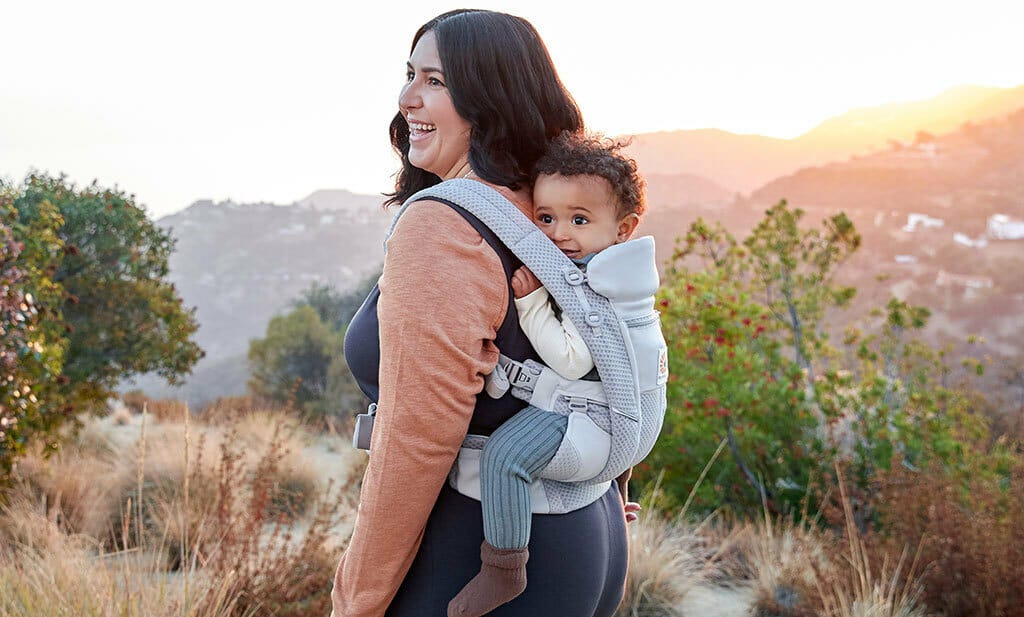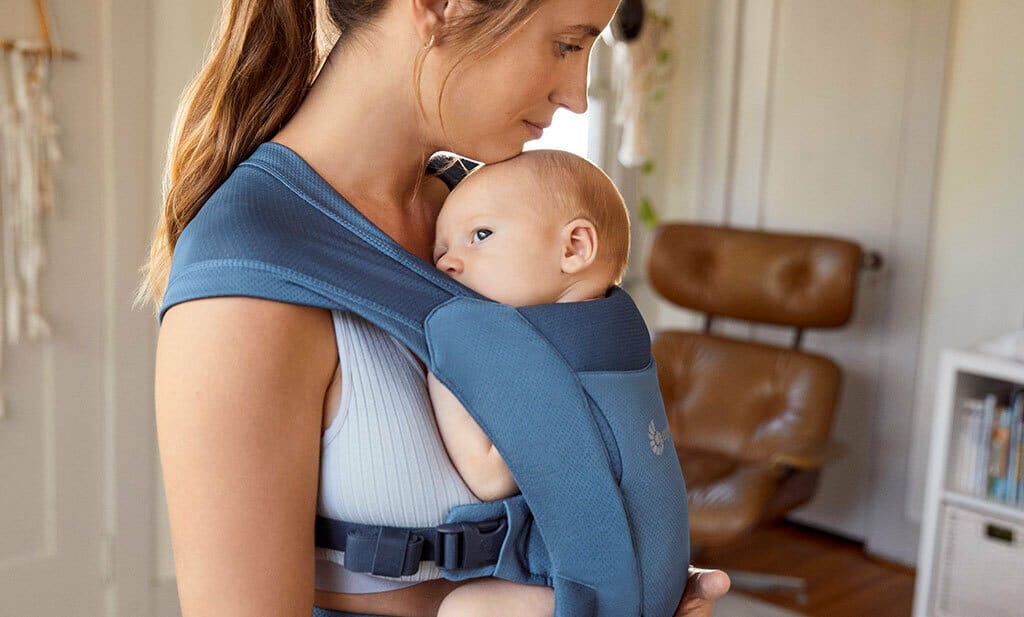
Baby carriers without back pain - do they even exist? We explain and disprove the most popular myths about babywearing
"Babywearing hurts your back", "Your baby will never learn to sleep on its own if it always sleeps in a baby carrier". "Too much carrying will give your child scoliosis". You may have heard these or similar prejudices about baby carriers before. That's why we would like to take this opportunity to explain why it is possible to have a baby carrier without getting back pain and why you don't have to worry that your child will be clingy the rest of their lives.
Reality check on the most common myths:
There is no such thing as a baby carrier without back pain
If your baby carrier is causing you back pain, it's probably not fitting properly. An ergonomic baby carrier that fits your body and your child's age should not hurt your back. Our Ergobaby baby carriers have even been awarded the seal of approval by the Aktion Gesunder Rücken e.V. association for being back-friendly. You might need to make a few adjustments to your carrier to distribute your baby's weight more evenly. For example, if your carrier is too low or too loose, it can put strain on your back, shoulders or neck. In turn, a well-fitting carrier can help improve your posture and core strength by encouraging you to stand upright and activate your core muscles. In contrast, pushing a pram, often weighed down by heavy bags or the week's shopping, can definitely cause back pain. So can lugging car seats in and out or awkwardly carrying them on one arm. Many parents therefore find carrying their baby in a carrier a more comfortable alternative.

Baby carriers are dangerous - because you could fall with baby on your chest
Not only when carrying in winter, but also when climbing stairs, walking over autumn leaves or tree roots, some people see a danger for children in baby carriers. It is automatic that most people walk more slowly and carefully when carrying their baby. In case we trip, most people would instinctively fall to the side to protect their baby. Tied so close to your body, the baby is much better protected than carried loosely in your arms. If you stumble, your child could fall or be thrown into the air. In a carrier, your baby is safe and secure and you have two hands free to support or hold onto him or her if necessary.
If you carry your baby all the time, he or she will not want to be put down.
Babies are natural carriers - so it makes biological sense and is even beneficial for them to be carried close to you and your body as much as possible in the first few months of life. In fact, close contact is actually crucial for their neurological development. Wearing will also help your baby become more confident and even more secure as time goes on - even if they arn’t particularly fond of being carried at first. So you don't have to worry that your baby won't eventually want to sleep in their own bed when they become more independent. The more closeness you give in the beginning, the sooner your child will become independent.

Baby carrier, summer, heat - not a good combination
The worry that your baby will automatically overheat in a carrier in the summer is unfounded. You have to do a lot of things wrong for that to happen. People all over the world carry their babies in all kinds of climates, even in very hot ones. The closeness to your body actually helps your child to regulate its own temperature and protects it from overheating. Of course, it is important not to dress your child too warmly, not to expose them to direct sunlight for long periods of time and to keep them well hydrated. It is best to use thin, natural and breathable fabrics. All exposed parts of the body must of course be protected from the sun. In addition, breathable mesh baby carriers such as the Omni Breeze, Adapt Softflex Mesh, Aerloom or Embrace Soft Air Mesh can help improve air circulation and reduce your sweating.
Carrying the baby upright is bad for the baby's back
No, human babies are born at a time when they are not yet fully mature. This is, so to speak, a compromise between nature and evolution: by walking upright, babies with their large heads would hardly fit through the pelvis and birth canal at a later stage of birth. This is called physiological premature birth. You can read here that carrying is intended by nature so that this physiological premature birth can mature undisturbed outside the womb. It is important, however, that you carry your baby in the M-position and that the back is always supported in a developmentally appropriate way. When buying a pushchair, please make sure that it has good suspension so that the child receives as few shocks as possible. .

Carrying in winter is much too cold for babies
You can still carry your baby in the cold season. A rough rule of thumb for babywearing is the carrier replaces at least one layer of clothing and everything that peeks out should be protected separately. Of course, you have to dress your baby according to the season, but always in such a way that it can still squat in the M position well.
When you enter a warm house, shop or restaurant, please remember to undress your baby accordingly. In addition, you can use a baby carrier in cooler temperatures or a baby carrier jacket, or All Weather Cover for the carrier in very cold temperatures to keep your baby cosy and warm. The best tips for carrying in winter can be found here.
Using a carrier/wrap is complicated
Like most aspects of parenting, babywearing can take a certain amount of practice and patience - but it's worth it. Many carriers can be put on and taken off in seconds. Our Ergobaby Aura baby wrap, for example, is child's play to tie. A centre marker and contrasting coloured seams give you orientation. Practice makes perfection!
It also always makes sense to try out different carrying aids and tying techniques to see which one(s) suits you best. And if you prefer a sling that doesn't have to be tied, you will find many carriers with only a few buckles in our range.
As you can see, it's all pretty easy! With the right carrier, you can make your everyday life much easier, do something good for your baby, have two free hands and, if used correctly, protect your back at the same time.





















